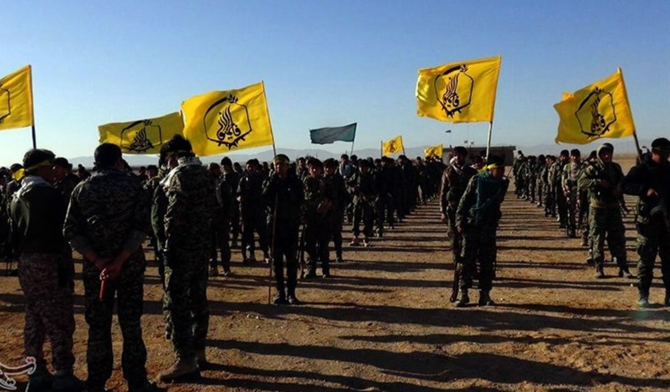
- ARAB NEWS
- 20 Apr 2024

As the uprising in Syria dissipates, Iran’s mercenary fighters from Pakistan and Afghanistan — the Zeinabiyoun and Fatemiyoun Brigades, respectively — seem to have slipped back into their respective countries without much noise. These men may not all be fit to fight again due to physical disabilities and psychological scars, but many still are. Those impaired by scars of the battlefield are used to inspire others to join the ranks to seek glory and martyrdom.
A few dozen are in the custody of Pakistani authorities facing interrogation and investigation. These militants are Iran’s insurance policy to protect its interests, even if they do not pick up arms. Hence, the question arises as to how Iran’s assets in its nuclear-armed neighbor will react if things go from bad to worse for the clerical rulers?
As witnessed in the case of other popular grassroots movements, Iran’s security services will find themselves in a quagmire. The officers and servicemen may comply with harsh orders or simply desert their positions. The latter would create a serious trust deficit within the command structures of otherwise disciplined organizations. Morale would begin to deplete, leading to an erosion of the organization’s credibility and effectiveness. The security situation is short of descending into a civil war predicament due to the unarmed nature of the protests, but they do reflect extreme civil disobedience and disorder. The IRGC is unlikely to deploy military forces across the country as it does not want to escalate clashes and further enrage the disenchanted Iranian public.
The recalling of mercenary fighters from Pakistan and Afghanistan to maintain law and order may appear worthwhile for the Iranian regime. Would the foot soldiers of Zeinabiyoun and Fatemiyoun resist firing on Iranian protesters? The shocking answer is no. These men are indoctrinated to sacrifice their lives for the preservation of the so-called Islamic revolution. In the eyes of foreign militants, rebelling Iranians deserve no sympathy. They are agents of the “imperialists,” or at least serve their cause. The otherwise unemployed zealots would not hesitate to be trigger-happy.
Zeinabiyoun and Fatemiyoun fighters are more suitable for use in restoring internal law and order, as both brigades were directly commanded by IRGC officers. Motivation and commitment notwithstanding, there will be serious handicaps. The lack of proficiency in Persian will hamper their communication and ability, especially for Zeinabiyoun fighters. Hunting for guerilla fighters in Syria is different from policing Iranian streets and finding peaceful protesters who disappear in their own streets and homes. Their sheer ignorance of local geography and peculiar urban nuisances would impede these foreign “peacekeepers.” If and when caught by the protesters, the deployment of foreign mercenaries would flame racial rage too.
The recalling of foreign mercenaries may lead to the Iranian regime’s worst nightmare becoming reality: Retaliation to Tehran’s excessive use of force. The opposition might take up arms or some security personnel could defect with their weapons and join the protesters, as was witnessed in Syria. Though it appears the least likely scenario at the moment, Iran will be bracing itself for bloody battles in its central cities, as well as in Sistan and Balochistan, Ahwaz, the Kurdish regions and Azeri-dominated northwestern provinces. These conditions would necessitate the use of any and every asset available to regain total control. In this far-fetched state of affairs, the clerics would resort to deploying every trusted and indoctrinated Shiite militant.
How would Pakistan respond if Iran chose to reactivate and recall its Zeinabiyoun mercenaries? Pakistan has long suffered from the effects of instability in Afghanistan and a similar situation in Iran would be too explosive for its domestic security. Even if the militants were recalled in the garb of pilgrims or visitors, Islamabad would most likely opt to close the border, while issuing stern messages through diplomatic channels.
These men are indoctrinated to sacrifice their lives for the preservation of the so-called Islamic revolution.
Dr. Mohammed Al-Sulami
The Taliban-led Afghan government may respond in a rather more confrontational manner. The group remains suspicious of Iran’s sectarian intentions and of its influence within Afghan territories. Kabul may opt for more extreme measures, such as preemptive arrests or military operations in Iran-bordering districts and villages.
The ongoing protests could go either way and Supreme Leader Ali Khamenei and the Islamic Revolutionary Guard Corps will not spare any resources to keep their iron grip over the Iranian people. It is too early to conclude, but it is fair to state that Iran’s neighboring countries can avert the spillover of Tehran’s unrest by distancing their institutions and citizens from its persistent internal turmoil.